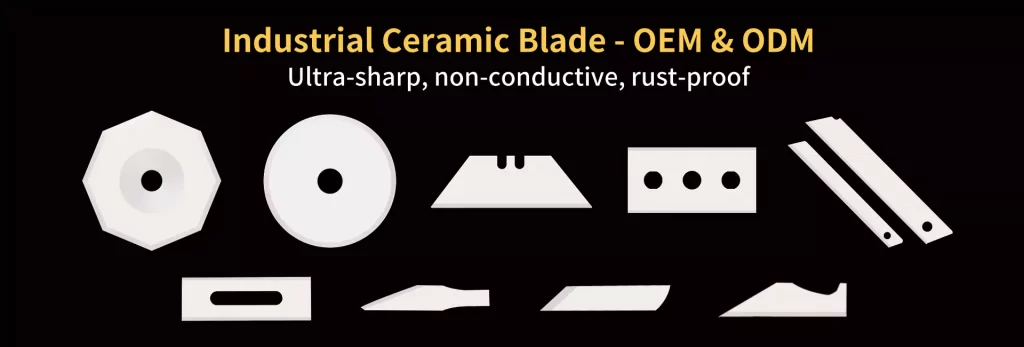
Ceramic textile blades, often made of materials like zirconia or alumina, are utilized in various industries for specific cutting applications. Here are some of their usage scenarios and functions:
- Textile Industry: These blades are extensively used for cutting and slicing textile materials due to their sharpness and resistance to wear. They can efficiently cut through fabrics without causing fraying or unraveling of threads, resulting in clean cuts.
- Paper and Cardboard Cutting: Ceramic textile blades are suitable for precise cutting of paper and cardboard materials. Their sharpness allows for clean, smooth cuts without tearing or damaging the material.
- Food Industry: In the food processing sector, these blades are used for slicing delicate food items such as baked goods, vegetables, or certain types of meats. Ceramic blades don’t transfer metallic ions to food and are resistant to corrosion, making them a hygienic choice.
- Electronics Manufacturing: Ceramic blades find applications in the electronics industry for cutting delicate components, such as circuit boards or semiconductor materials, where precision and minimal damage are crucial.
- Medical Industry: They are used in surgical instruments for precision cutting during certain medical procedures. Ceramic blades can offer a high level of sharpness, reducing tissue trauma during surgeries.
- Packaging Industry: Ceramic blades are used for cutting plastic films, foils, and other packaging materials due to their ability to provide clean and precise cuts without damaging the contents.
- Chemical and Industrial Processing: In chemical and industrial settings, these blades are employed for cutting various materials that might be abrasive or corrosive, as ceramics are resistant to such conditions.
Functions of Ceramic Textile Blades:
- Sharpness: Ceramic blades are known for their exceptional sharpness, allowing for precise cutting of different materials without requiring frequent sharpening.
- Hardness and Wear Resistance: Ceramics are extremely hard and wear-resistant, which helps maintain the blade’s sharp edge for an extended period, reducing the need for frequent replacements.
- Chemical Inertness: They are resistant to chemical corrosion, making them suitable for use in environments where exposure to harsh chemicals is a concern.
- Non-conductive Nature: Ceramic blades are non-conductive, which is beneficial when cutting materials that are sensitive to electrical conductivity, such as certain electronics or components.
However, it’s important to note that while ceramic blades offer numerous advantages, they can be brittle compared to steel blades and may be more prone to chipping or breakage if subjected to excessive force or impact. Therefore, they are best suited for applications where precision and delicacy are prioritized over heavy-duty cutting tasks.
